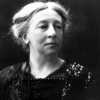Lady Gregory

Lady Gregory
Isabella Augusta, Lady Gregorywas an Irish dramatist, folklorist and theatre manager. With William Butler Yeats and Edward Martyn, she co-founded the Irish Literary Theatre and the Abbey Theatre, and wrote numerous short works for both companies. Lady Gregory produced a number of books of retellings of stories taken from Irish mythology. Born into a class that identified closely with British rule, her conversion to cultural nationalism, as evidenced by her writings, was emblematic of many of the political struggles to...
NationalityIrish
ProfessionDramatist
Date of Birth15 March 1852
CountryIreland
What makes Ireland inclined toward the drama is that it's a great country for conversation.
Napoleon the Third was not much. He died in England, and was buried in a country church-yard much the same as Kiltartan. But Napoleon the First was a great man; it was given out of him there never would be so great a man again.
What the Danes left in Ireland were hens and weasels. And when the cock crows in the morning, the country people will always say 'It is for Denmark they are crowing. Crowing they are to be back in Denmark.'
I'll take no charity! What I get I'll earn by taking it. I would feel no pleasure it being given to me, any more than a huntsman would take pleasure being made a present of a dead fox, in place of getting a run across country after it.
I was told in many places of Osgar's bravery and Goll's strength and Conan's bitter tongue, and the arguments of Oisin and Patrick. And I have often been given the story of Oisin's journey to Tir-nan-Og, the Country of the Young, that is, as I am told, a fine place and everything that is good is in it.
We would not give up our own country - Ireland - if we were to get the whole world as an estate, and the Country of the Young along with it.
When I was a child and came with my elders to Galway for their salmon fishing in the river that rushes past the gaol, I used to look with awe at the window where men were hung, and the dark, closed gate.
It was in a stonecutter's house where I went to have a headstone made for Raftery's grave that I found a manuscript book of his poems, written out in the clear beautiful Irish characters.
It is not known, now, for what length of time the Tuatha de Danaan had the sway over Ireland, and it is likely it was a long time they had it, but they were put from it at last.
The Gaelic language itself depends very much on ear and rhythm, and when those who are thinking in Gaelic speak in English, they get the same rhythm.
When death comes, it is not enough to have been charitable; and it is not right to touch the body or lay it out for a couple of hours; for the soul should be given time to fight for itself, and to go up to judgment.
The Georges were fair; they left all to the Government; but Anne was very bad and a tyrant. She tyrannised over the Irish. She died broken-hearted with all the bad things that were going on about her. For Queen Anne was very wicked; oh, very wicked, indeed!
I really do not see why there is not a splendid field for good work on the music hall stage, and if I did not have my own theatre taking up my time, I should rather like to go into it.
I don't think Ireland has ever had a genius for the novel. Of course, there were plenty of Irish novels, but I don't think that was ever the natural means of expression for the Irish.